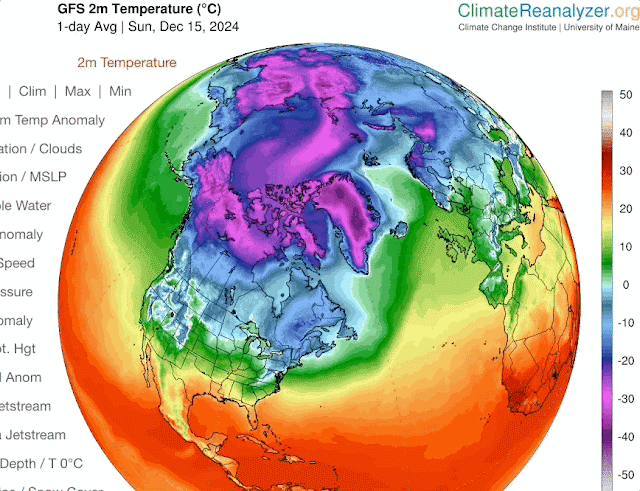~Surreal open water end of December, Hudson Bay illustrates Earth Warming fast
JAXA Dec 23 comparison , sea ice extent, 2012, 2016, 2023, 2024 ; respectively year of:warmest sea ice melt in history, 2016 very powerful El-Nino, last year middle of a milder El-Nino than 2016 , current December 23 (2024).It is fair to say 2012 greatest sea ice melt in history would take longer to recover, it is equally succinct to demonstrate warmest El-Nino effects should be bad for sea ice in 2016, Hudson Bay started to show even slower refreeze in 2023, but 2024 surpasses them all:
December 23 2024, incredible certainly for the people living on Hudson Bay Eastern shores.Sea water usually doesn't freeze at -1 C unless 2 m air temperatures are about -11 C or colder, in especially calm winds:
CMC 0 C degree sea surface temperature line way North.
Albedo caused by near 0 degree Centigrade fog and clouds gracefully slow down Arctic Ocean sea ice melting totally during summer. Hudson Bay gets less of this happenstance because it is surrounded by land, once upon a time more frozen for a long period of the year. Not anymore, since mainly from the West air circulating over drier vast lands eventually sheds its total moisture content, causing more over all sunshine. Equally these lesser clouds over H.B. bombards its sea water to be warmer, the surrounding lands likewise.
The lesson here is that faced with a lesser cloud summer event, the Arctic Ocean sea ice would pretty much easily disappear at extent minima. Hudson Bay total sea ice cover, once a beginning of December event, now moves forward into winter not as fiercely cold as it was just a few years ago. WD December 25, 2024.








